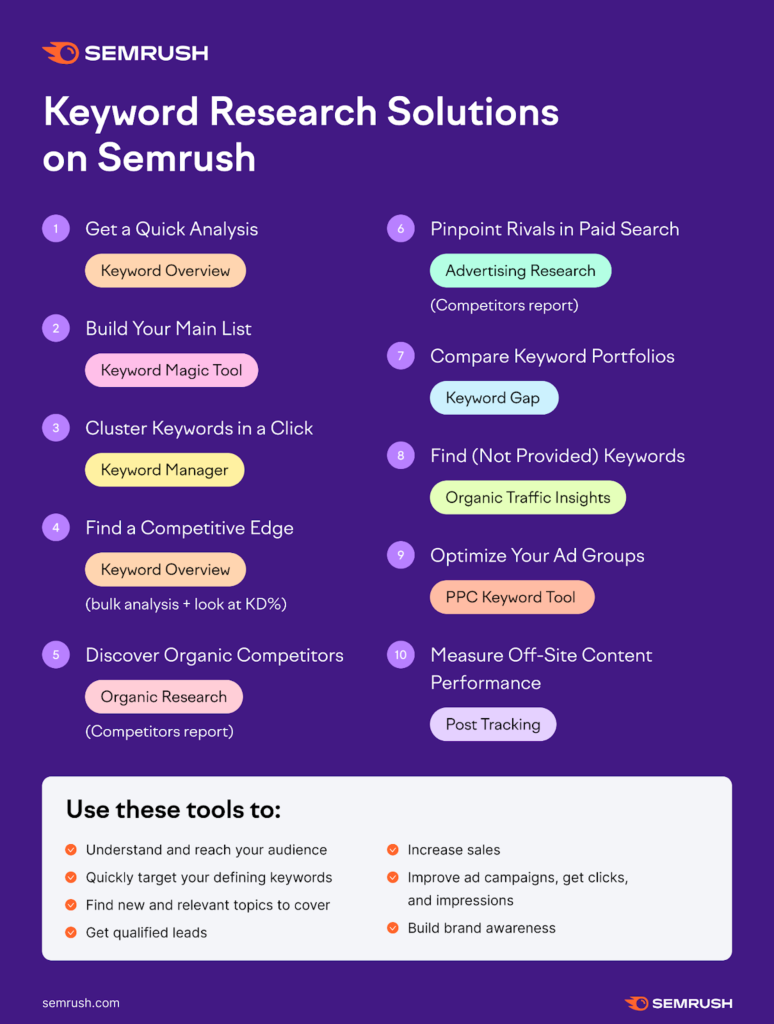How to use Semrush for keyword research, start by entering a seed keyword into the search bar? Analyze the provided data to identify valuable keywords.
Semrush is a powerful tool for digital marketers aiming to enhance their keyword strategies. By leveraging this platform, users can uncover high-traffic keywords and competitive insights. The process begins with entering a seed keyword, which Semrush analyzes to provide a wealth of data.
This includes keyword difficulty, search volume, and related terms. Such information helps in crafting effective content that ranks well on search engines. Semrush also offers competitor analysis, showing which keywords rival sites rank for. This comprehensive approach enables users to refine their SEO tactics and achieve better online visibility.

Credit: www.semrush.com
Introduction To Semrush
Understanding keyword research is essential for effective SEO. Semrush is a powerful tool for this purpose. It helps you find the best keywords for your content.
In this section, we will introduce Semrush and explain its significance. We will also discuss the importance of keyword research.
What Is Semrush?
Semrush is a comprehensive SEO tool. It offers various features for digital marketing. It helps in keyword research, site audits, and competitive analysis.
Semrush provides data-driven insights. These insights help you improve your website’s performance. It is trusted by many professionals worldwide.
Importance Of Keyword Research
Keyword research is crucial for SEO success. It helps you understand what your audience is searching for. This knowledge allows you to create relevant content.
Good keyword research can increase your website traffic. It can also improve your search engine rankings. You can attract the right audience to your site.
Using the right keywords can enhance your content strategy. It ensures that your content is aligned with user intent. This alignment leads to better engagement and conversions.
Setting Up Your Semrush Account
Setting up your Semrush account is the first step in your keyword research journey. This section will guide you through the process, from creating an account to navigating the dashboard. Follow these steps to get started with ease.
Creating An Account
Creating an account on Semrush is simple and quick. Follow these steps:
- Go to the Semrush website.
- Click on the Sign Up button.
- Enter your email and choose a strong password.
- Verify your email to complete the registration.
Once you have created your account, you can start exploring the features. Semrush offers a free trial period. This allows you to test the tools without any commitment.
Navigating The Dashboard
The dashboard is your control center in Semrush. Here’s how to navigate it:
- Projects: Manage your SEO campaigns.
- Keyword Analytics: Find and analyze keywords.
- Domain Analytics: Check your competitors’ performance.
- Reports: Generate detailed reports.
The dashboard is user-friendly and intuitive. Each section is designed to provide you with the necessary tools for keyword research. You can easily switch between sections and find what you need.
Below is a quick reference table for the main sections of the dashboard:
| Section | Description |
|---|---|
| Projects | Manage and monitor your SEO projects. |
| Keyword Analytics | Discover and analyze keywords. |
| Domain Analytics | Analyze competitor domains. |
| Reports | Generate SEO and marketing reports. |
By following these steps, you will be ready to use Semrush effectively. Start your keyword research journey with confidence and make the most of this powerful tool.
Using The Keyword Magic Tool
The Keyword Magic Tool in Semrush is an essential feature for effective keyword research. It helps discover the most relevant keywords for your niche. This tool can boost your website’s SEO performance. Here’s how to make the most of it.
Accessing The Tool
First, log in to your Semrush account. Navigate to the Keyword Analytics section. Click on the Keyword Magic Tool. This will take you to the main interface.
You will see a search bar. Type in your seed keyword here. Press enter to start your keyword research journey.
Finding Relevant Keywords
Once you enter your seed keyword, a list of related keywords will appear. Use the filters to narrow down your search. You can filter by:
- Search volume
- Keyword difficulty
- Cost-per-click (CPC)
- Competitive density
For better results, use the Broad Match filter. This will show you variations of your seed keyword. You can also use the Phrase Match filter for more targeted results.
Look for keywords with high search volume and low competition. These are the golden keywords for your content strategy.
Export your keyword list for easy reference. This will help in planning your content and SEO strategy effectively.
| Filter | Purpose |
|---|---|
| Search Volume | Find popular keywords |
| Keyword Difficulty | Identify easy-to-rank keywords |
| CPC | Estimate cost for paid ads |
| Competitive Density | Measure competition level |
Using the Keyword Magic Tool can greatly improve your SEO strategy. It’s user-friendly and powerful. Start exploring and find the best keywords for your website today!

Credit: www.semrush.com
Analyzing Keyword Metrics
Analyzing keyword metrics in Semrush is crucial for effective keyword research. By understanding these metrics, you can make informed decisions about your content strategy. Let’s explore how to analyze key metrics using Semrush.
Search Volume
Search volume shows how often a keyword is searched. It helps you understand the popularity of a keyword.
In Semrush, you can find the search volume metric in the Keyword Overview report. A higher search volume means more potential traffic.
| Keyword | Search Volume |
|---|---|
| SEO Tips | 10,000 |
| Keyword Research | 8,000 |
Keyword Difficulty
Keyword difficulty indicates how hard it is to rank for a keyword. It helps you choose the right keywords for your strategy.
In Semrush, the keyword difficulty metric is found in the Keyword Magic Tool. A lower difficulty score means easier ranking.
- 0-29: Very easy
- 30-49: Easy
- 50-69: Moderate
- 70-89: Hard
- 90-100: Very hard
For example, a keyword with a difficulty score of 35 is easier to rank for than a keyword with a score of 80.
Exploring Competitor Keywords
Exploring competitor keywords is a vital part of keyword research. It helps you understand what keywords your competitors are ranking for. This can give you a competitive edge. By using Semrush, you can easily uncover these keywords and plan your strategy accordingly.
Identifying Competitors
Start by identifying your main competitors. Use Semrush’s Domain Overview tool for this task. Enter your website’s domain and Semrush will show a list of competitors. These are websites that rank for similar keywords as you.
Make a list of these competitors. Focus on the top-ranking ones. This list will be your primary source for keyword analysis.
| Competitor Domain | Common Keywords |
|---|---|
| example1.com | 100 |
| example2.com | 150 |
Analyzing Competitor Keywords
Once you have your list, analyze their keywords. Use Semrush’s Keyword Gap tool. Enter your domain and your competitors’ domains. This tool will show you the keywords they rank for but you don’t.
Focus on the high-volume keywords. These keywords can bring more traffic to your site. Also, look at the competition level for each keyword. Prioritize keywords with low to medium competition.
- Enter your domain and competitors’ domains.
- Analyze the keyword gap report.
- Identify high-volume, low-competition keywords.
Export the list of these keywords. Use them to optimize your content and improve your rankings.
Pro Tip: Regularly update your competitor list. Competitors change over time. Keep track of new and emerging competitors.
Utilizing The Keyword Gap Tool
The Keyword Gap Tool in Semrush is a powerful feature that helps you identify keyword opportunities. It allows you to compare your website’s keywords with those of your competitors. This can help you discover gaps in your keyword strategy and target new keywords that can improve your search rankings.
Understanding Keyword Gaps
Keyword gaps occur when your competitors rank for keywords that you do not. These gaps represent opportunities for your site to improve and attract more traffic.
- Identify competitors: First, list your top competitors.
- Analyze keywords: Use the Keyword Gap Tool to compare keywords.
- Spot gaps: Look for keywords your competitors rank for, but you do not.
Finding Opportunities
The Keyword Gap Tool not only shows gaps but also potential opportunities. By addressing these gaps, you can enhance your SEO strategy.
| Action | Explanation |
|---|---|
| Sort Keywords | Sort keywords by volume and difficulty to find the best opportunities. |
| Target Easy Wins | Focus on keywords with low difficulty but high search volume. |
| Analyze Competitor Content | Study how competitors use these keywords in their content. |
By using the Keyword Gap Tool effectively, you can uncover hidden opportunities. This can help your website attract more organic traffic and improve its search rankings.
Tracking Keyword Rankings
Tracking keyword rankings in Semrush is vital for SEO success. It helps you understand how well your keywords perform. This section will guide you through setting up and interpreting keyword rankings.
Setting Up Rank Tracking
First, log in to your Semrush account. Navigate to the Position Tracking tool. Click on Set up Tracking. Enter your domain name and select your target location.
Next, add the keywords you want to track. You can add them manually or import them. Click on Add Keywords to start tracking.
Once added, Semrush will begin tracking these keywords. You will see their rankings updated daily. This gives you a clear picture of your keyword performance.
Interpreting Ranking Data
In the Position Tracking dashboard, you will see a table of data. This data includes your keyword rankings, search volume, and more.
Key columns to focus on:
- Rank: Current position of your keyword in search results.
- Search Volume: Monthly search volume for the keyword.
- Traffic %: Percentage of traffic driven by the keyword.
- Visibility %: Visibility score of your keyword.
This table helps you identify which keywords are performing well. It also shows which keywords need improvement. Regularly check this data to keep your SEO strategy on track.
Advanced Tips For Keyword Research
Unlocking the full potential of Semrush for keyword research requires advanced techniques. This section delves into expert tips that elevate your keyword strategy. Let’s explore how to utilize Semrush for long-tail keywords and seasonal keywords.
Long-tail Keywords
Long-tail keywords are phrases that capture specific search intents. These keywords often have lower search volumes but higher conversion rates. Here’s how to find them using Semrush:
- Go to the Keyword Magic Tool in Semrush.
- Enter your main keyword and click Search.
- Filter results by Word Count to find longer phrases.
Long-tail keywords are less competitive. They are easier to rank for and often bring more engaged visitors.
Seasonal Keywords
Seasonal keywords peak at specific times of the year. Identifying these keywords can boost your traffic during peak seasons. Here’s how to find them using Semrush:
- Use the Keyword Overview tool.
- Enter a keyword and click Search.
- Scroll to the Trend section to see monthly search volume.
Plan your content around these trends. This ensures maximum visibility during peak times.
| Keyword Type | Advantages |
|---|---|
| Long-Tail Keywords | Low competition, high conversion rates, specific search intent |
| Seasonal Keywords | Peak traffic during seasons, high search volume during specific times |
By focusing on long-tail and seasonal keywords, you can refine your strategy. This will help you capture more targeted traffic and improve your SEO results.

Credit: www.semrush.com
Frequently Asked Questions
What Is Semrush Used For?
Semrush is a powerful SEO tool used for keyword research, competitor analysis, and site audits. It helps improve website visibility.
How Do You Find Keywords In Semrush?
To find keywords, use the Keyword Magic Tool. Enter a seed keyword, and Semrush will generate related keyword suggestions.
Can Semrush Analyze Competitors’ Keywords?
Yes, Semrush can analyze competitors’ keywords. Use the Domain Overview tool to see competitor keywords and strategies.
How Accurate Is Semrush Keyword Data?
Semrush keyword data is highly accurate. It uses a vast database and advanced algorithms to provide reliable insights.
Mastering Semrush for keyword research can boost your SEO efforts significantly. This tool offers valuable insights and data. By leveraging its features, you can find high-performing keywords and optimize your content. Start using Semrush today to enhance your website’s visibility and drive more organic traffic.
Why I am a Wealthy Affiliate Member? Discover the Benefits!

